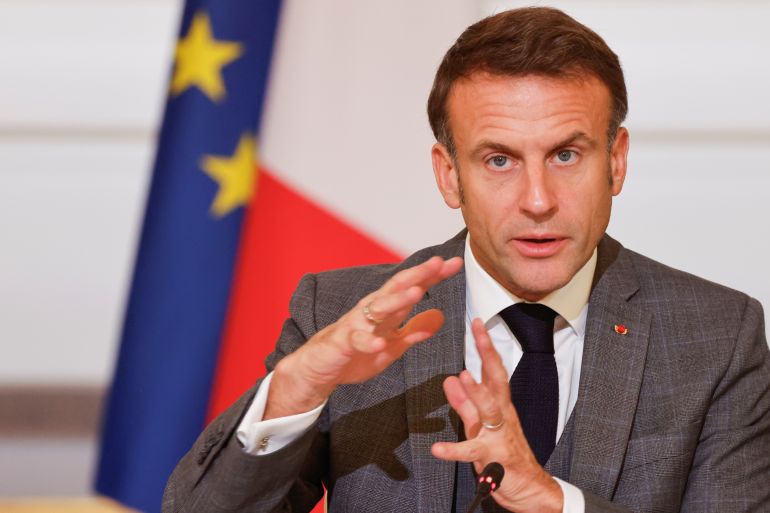France’s Macron does not rule out Europeans sending troops to Ukraine
French president opens door to European nations sending troops to Ukraine, although he cautioned that there was no consensus at this stage.

French President Emmanuel Macron has said that sending Western ground troops to Ukraine could not be “ruled out” as European allies announced new measures to deliver munitions and boost Kyiv in its fight against Russia.
The comments on Monday came after some 20 European leaders gathered in Paris to send Russian President Vladimir Putin a message of European resolve on Ukraine and counter the Kremlin’s narrative that Moscow was bound to win a war now in its third year.
Keep reading
list of 3 itemsNavalny was close to being freed from prison before his death, says ally
Hungary ratifies Sweden’s NATO bid, clearing final obstacle to membership
“We are convinced that the defeat of Russia is indispensable to security and stability in Europe,” Macron told reporters after the meeting.
“There’s no consensus today to send in an official, endorsed manner troops on the ground. But in terms of dynamics, nothing can be ruled out,” he said.
“We will do everything that we must so that Russia does not win.”
Macron declined to provide details about which nations were considering sending troops, saying he prefers to maintain some “strategic ambiguity”.
A White House official told the Reuters news agency that the United States had no plans to send troops to fight in Ukraine and that there were also no plans to send NATO troops to fight in Ukraine.
We are talking about our support for Ukraine and our collective security.
A collective leap is necessary from all of us. pic.twitter.com/NViI9ntaVY
— Emmanuel Macron (@EmmanuelMacron) February 26, 2024
The conference in Paris signalled Macron’s eagerness to present himself as a European champion of Ukraine’s cause, amid growing fears that US support could wane in the coming years. German Chancellor Olaf Scholz and Poland’s President Andrzej Duda were among the European heads of state and government present at the conference, while Ukrainian President Volodymyr Zelenskyy joined virtually.
Duda said the most heated discussion was about whether to send troops to Ukraine and “there was no agreement on the matter”.
“Opinions differ here, but there are no such decisions,” he said.
Slovak Prime Minister Robert Fico, who has opposed military aid to Ukraine, meanwhile said several NATO and European Union members were considering sending soldiers to Ukraine on a bilateral basis.
“I can confirm there are countries that are prepared to send their own troops to Ukraine, there are countries that say never, among which Slovakia belongs, and there are countries that say this proposal needs to be considered,” he said before boarding his plane home.
The conference was called as Ukraine suffered setbacks on eastern battlefields, with its generals complaining of shortages of arms and soldiers. It saw progress on a Czech-led initiative to buy hundreds of thousands of ammunition rounds from third countries, something that France has been cautious about as it wants to prioritise developing Europe’s own industry.
Ammunition supplies have become a critical issue for Kyiv.
The EU, though, is falling short of its target of sending Ukraine a million rounds of artillery shells by March.
Czech Prime Minister Petr Fiala said about 15 countries had agreed to sign up to his initiative. “We are talking about hundreds of thousands of pieces of ammunition we should and could get in relatively short time,” Fiala told reporters.
Defence ministers had been mandated to come up with a plan within the next 10 days, Portugal’s Prime Minister Antonio Costa said.
Rutte said the Netherlands would contribute 100 million euros ($108.5m) for the purchase of munitions overseas. He said the countries that would provide the munitions had asked not to be identified.
“I think there was a great sense of urgency, particularly for the short term on ammunition and on air defence,” Rutte said. “I hope other countries will follow.”
Macron also announced a new coalition would be set up to supply Ukraine with “missiles and bombs of medium and long range to carry out deep strikes”. There was a “broad consensus to do more and quicker”, he added, saying there was also a consensus to ramp up joint production of armaments with Ukraine and boost its own military industry.
The Paris conference comes after France, Germany and the UK recently signed 10-year bilateral agreements with Ukraine to send a strong signal of long-term backing as Kyiv works to shore up Western support.